 |
| relaxing stroll in Datong |
Datong (大同), located 250 kilometers west of Beijing, is popular for being “the city of coal”. This city in Shanxi Province plays a big role on providing one of the country’s largest sources of energy. It also has relevant historical citations dating back when it used to be the capital of Northern Wei starting the year 386 AD. It also houses one of the four holy mountains of Taoism in China, Mt. Hengshan. For me, the main reasons of my visiting here is the famous relics such as the Yungang Grottoes and Hanging Monastery.
 |
| a unique mosque in Datong! I would have gone inside but it seems that they were closed for the day |
After five hours, we have soon arrived at Xinnan Passenger Transport Station, I took a cab going to Datong Youth Hostel, checked in and took a couple minutes of rest. It was already too late to try and go to Yungang Grottoes so I set it for the next day by taking a cab service that the hostel offers. I got out and explored more of the city, the hostel’s location is at a busy shopping street which was a good place to people watch. It’s also a stone throw away from Huayan Monastery (华严寺 – hua yan si), which I did not visit due to its steep entrance fee of 80 CNY.
 |
| a performance stage near the monastery |
I took a walk to see more of the neighborhood. Most of the city is going on under major constructions and most of the sights are new. I believe Datong City Wall (城墙 – chéng qiáng), have been around since 14th century. The government is exerting a great deal of effort on rebuilding it and other related historical structures to boost tourism. I was also able to see lots of traditional homes being torn down to pave way for this restoration. Somehow, it didn’t feel anything authentic to me.
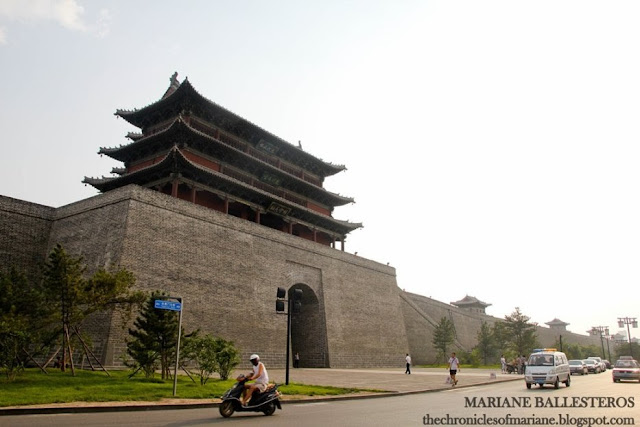 |
| one of the main gates of Datong City Wall |
 |
| a tower in the middle of intersection that is under going repairs |
I arrived at one of the sights of Datong, the Nine-Dragon Screen (九龙壁 – jiǔ lóng bì). and was asked for a 5 CNY entrance fee. The bright glazed wall was built during the Ming dynasty and it depicts nine colorful flying dragons that is also said to be the largest glazed screen in the country. The wall looks impressive, but that was it. One could spend less than five minutes appreciating the area, but seeing a structure that has lived on for 600 years was still a satisfying experience and a good one for my first day in the country.
 |
| the famous Nine-Dragon Screen of Datong |
 |
| the pond was very dry when I was there |
 |
| probably the only relaxing view in Datong and the only best place to have a quiet reflection time |
I later on explored the Huayan street that has impressive buildings, they also look quite new and freshly painted but I didn’t mind. I was there on a weekend so I was in time to catch some Saturday happenings they got there during the evening. There was a good band playing and the buildings were lit up. This area looks amazing during nighttime.
 |
| new houses with traditional designs |
 |
| a very lovely restaurant, its architecture is same to what I saw at Pingyao |
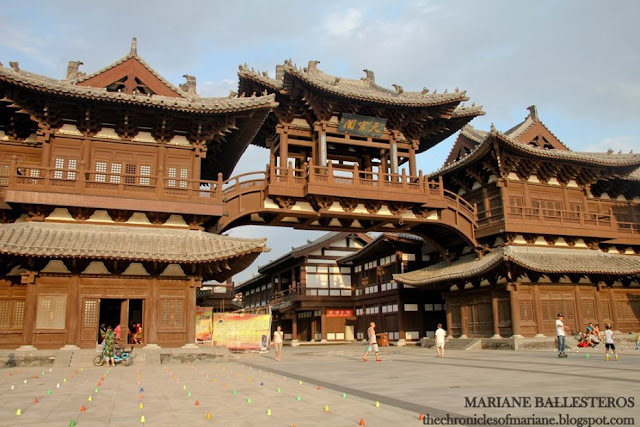 |
| I'm not really very knowledgeable with Chinese architecture but these buildings remind me of Japan |
 |
| the stray dogs of China! they all look so cute and fluffy! though I was a bit afraid to go near due to the fear of being bitten and getting rabies abroad! |
 |
| busy shopping street of Datong, similar to what you can see at Qianmen Street of Beijing |
 |
| night performance on a weekend night! really good band! |
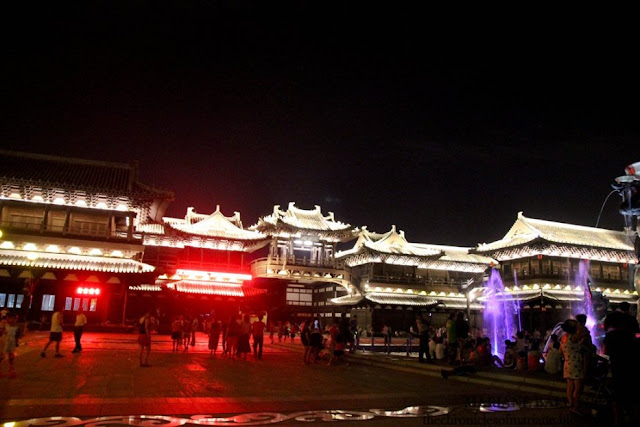 |
| the look of the buildings during nighttime <3 |
 |
| it's so lively! lots of people were gathering around this square |
 |
| the restaurant I saw earlier, lovelier during night! |
I took a rest quite early that night as next day, we’ll be starting our tour by 8 AM. I was pretty excited to see two of the most boasted sights of Datong!
Accommodation (Datong Youth Hostel Review) :
I stayed at the only backpackers-type available accommodation in the city, Datong Youth Hostel (大同青年旅社). Located at Huayan Street, it was pretty accessible to city sights such as the Huayan Monastery and Nine-Dragon Screen temple. The dormitory price was ok, no complains about the bed but my only criticism was that the bathroom smelled which seems to be a common problem on all hostels in China, (though it might differ which room you stay because there was no bad smell at all on the second room that I transferred to), and their staff, though helpful, could be quite awkward sometimes due to only Basic speaking ability of the English language. Wi-Fi was good but the location of the hostel was pretty weird, it being located on the third floor of a building underneath a children’s clothing store didn’t make sense to me. The tours they offer is not necessarily a tour but just a taxi service (a same service I also availed at my hostel in Pingyao), which would be cheaper as you wouldn’t be required to have a tour guide. Anyway, I would recommend the place but I hope they make some improvements :)
Address:
仿古街(步行街)中段路西 (大同, 037006)
Fang gu jie (bu xing jie) Zhongduan lu xi (Datong, 037006)
Fang gu street, Zhongduan West Road, Datong, 037006
Phone: +863522427766
Email: 1161189938@qq.com
How to go to Datong from Beijing:
You may opt to take the train that will take six hours of travel...
Or do what I did and take the bus
Head off to Liuliqiao station and bus a ticket for 133 ¥ one way, it will take you to Xinnan station of Datong and travel time is more or less five hours.
 |
| the very lively atmosphere of Datong on weekends |
More of China here

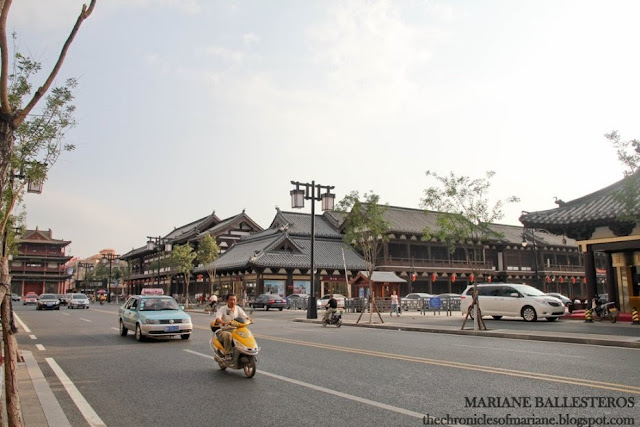

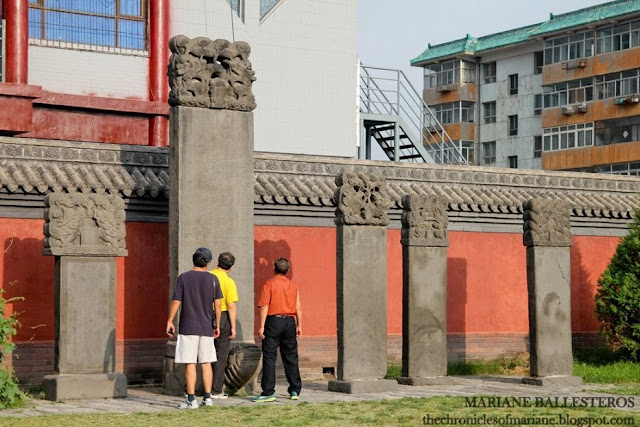






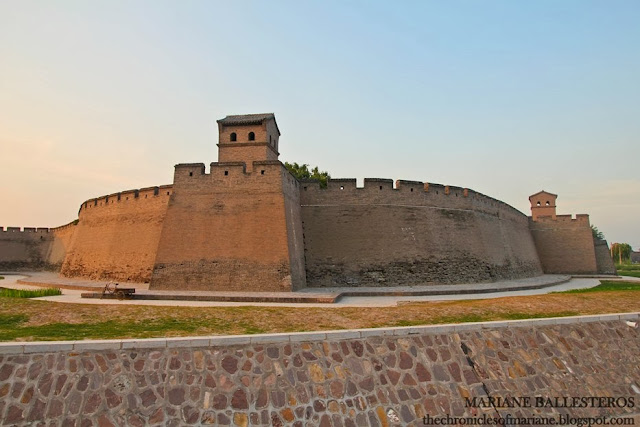











.jpg)
i just want to visit Great walls what airline to book and what is the nearest airport, how did u get ur visa
ReplyDeleteYes, those buildings remind of Japan, because Japan was influenced by China during the Tang dynasty (618 – 907 AD) and has preserved most features of Tang, but architecture in China itself has continue to evolve and almost eveything traditional we see in today's China is that of Ming (1368 — 1644 AD) and Qing (1644-1911) dynasties. But those particular buildings were built in the Tang dynasty style, so that is why they remind of Japan.
ReplyDeleteHi
DeleteI came across your blog because I have always wanted to visit Asia (specifically China, Korea, and Japan) because of my interest in East Asian buildings.
As the poster above mentioned, the reason why you thought those buildings looked like Japan was because Datong is trying to go Classical Chinese with the architecture. In other words, they are trying to go pre-Yuan Dynasty style buildings. The Tang Dynasty was among the most powerful nation at the time and Japan sent multiple missions to try to emulate the Chinese. This continued on even in later dynasties such as the Song Dynasty when newer Chinese building methods also made its way into Japan.
I find it sad that there are some that automatically see "Japan" whenever they see Chinese building done in the classical style. Especially since the Japanese learned the building style from the Chinese Dynasties to begin with. People living during those times that visit Japan will instead say that these buildings remind them of Tang (or Song) etc depending on the current Chinese Dynasty.
The second sad thing; some of the newer buildings in Datong I don't know how authentic they are. At the very least for someone who study these ancient buildings, I see that real surviving Tang Dynasty and Song Dynasty buildings look way nicer than this. Problem is, they are not building according to rules, instead they build with modern techniques. If they have true carpenters who built according to ancient rules through ancient proportions and calculations, the buildings will look very nice. Thankfully there are such gems in Datong still. The Huayan and Shanhua Monastery (which I believe you didn't go in) have some buildings surviving from the Jin Dynasty (which is a Pre-Yuan era).
Hello Anon 10:31 AM, it's great to hear your interesting insights on this. I have to admit that I am someone who has little interest in history, so I didn't read up before going to China and even before writing this post. For travelers like me who are sometimes in a rush to do research, it would be the best to get a guide like you and anon 4:53PM who are obviously more knowledgeable on this aspect. I have written this five years ago, so what I have written before may not be what I think about these places now. There is also very few information about Datong on online guides and so it was almost automatic for me then to just see nearby places, given that I was very intimated of China. If I would have the chance to go back again, I will try to visit more authentic sites.
Delete